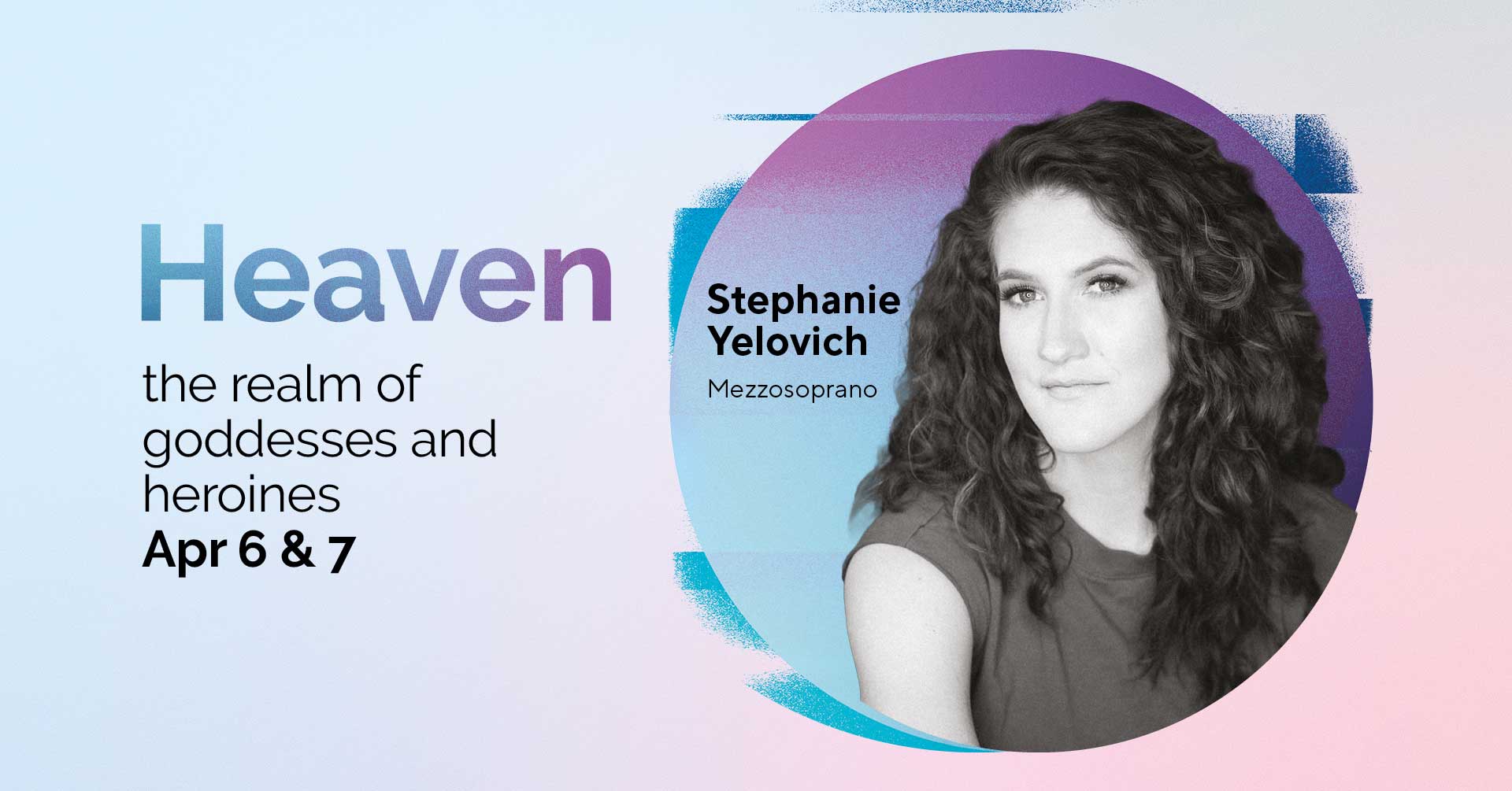
- This event has passed.
Heaven
April 7, 2024 @ 2:00 pm - 3:30 pm

Hector Berlioz (1803–1869): Cléopâtre, scene lyrique (1829)
Pierre-Ange Vieillard, text
Berlioz re-animated the death of Cleopatra through a re-telling—in her own voice—of the sorrow and despair she felt after the death of her two lovers: Julius Caesar and Marc Antony. The mezzo-soprano is required to bring us through the agony and anguish our heroine felt after her lover killed himself, her captor rejected her pleas, and, at long last, Cleopatra’s reign and riches had come to an end. Cleopatra declares that “there is nothing left for me but eternal night!” and the music goes on to a meditation on her requests to the great pharaohs to prepare her a place fit for a queen in the pyramids. Singing of the ways the gods have betrayed her in the final aria, Cleopatra declares her decision to end her life with the venom of a poisonous snake. Berlioz, at the incredibly young age of 26, chose to end this feverish piece with a surprising quiet brooding of the double basses—almost mimicking Cleopatra’s life extinguished. The piece was written as Berlioz’s entry to win the prestigious Prix de Rome award, a prize that would have given him lodging in Rome and five years of funding. Berlioz did not win the prize that year because the jury did not like the bold and modern musicality of the piece, but many blame his loss on a last-minute substitution of his chosen mezzo-soprano with her sister, who was not able to master the notoriously difficult arias. Luckily, Berlioz was not too put out by this and his next work was the innovative Symphonie Fantastique which catapulted him to recognition as a composer, finally winning the Prix de Rome at its next iteration.
by Christina Vanden Bosch der Nederlanden
Giuseppe Verdi (1813–1901): Overture to La Forza del Destino (rev. 1869)
La Forza del Destino (“The Force of Destiny”) was written in 1862 for a large fee offered by the St. Petersburg opera, inducing Verdi out of a reclusive period. After an extended stay in Paris, Verdi had returned to Italy in 1857, but several of his operas since then had been poorly received. He had also had brushes with the censors, who objected to his graphic portrayal of royal and church figures in his opera plots.
Forza represented a triumphal comeback, and for many people it is one of Verdi’s greatest operas. The overture encapsulates several important motifs from the plot. After strident opening chords in the brass, Leonora’s “fate” theme is heard insistently in the strings. Next is a plaintive andantino theme in the woodwinds, which depicts Alvaro agonising over taking up arms as a priest. An allegro solo in the clarinet is the second of Leonora’s motifs, this one a little more cheerful. Then follows an extended exposition of Leonora’s third theme, culminating as a chorale that represents her ultimate religious aspirations. After brief re-appearances of several thematic ideas, including the “fate” motif, the overture moves on to a classic Verdi finale.
by Stephen Walter ©
“O don fatale” from Don Carlos (1867)
C. du Locle/J. Méry, libretto – A. de Lauzièrs/A. Zanardini, italian translation
Verdi’s grand opera Don Carlos holds one of those few paradigmatic roles for a mezzo—a voice with a somewhat lower register than a soprano—in Princess Eboli, who is in love with Don Carlos, the infante of the King Philip II of Spain. [Note: Princess Eboli is friends with Queen Elizabeth, the spouse of King Philip II and is not related to them; she’s a princess of another place]. Eboli disguises as the Queen Elizabeth in a masked ball and Don Carlos, who is secretly in love with the Queen, professes his love. Blinded by jealousy, Princess Eboli, plots a plan to take revenge of Don Carlos who is then sentenced to execution. However, this plan also damages the Queen’s reputation. Realizing that she went too far, she confesses to the Queen who makes her choose between a cloister and exile. Right after this, she sings “O don fatale”.
It is both a lyrical and a powerful aria. A very dramatic beginning with the echoing of a funeral march, presents Eboli cursing her own assumed beauty. Verdi gives her only short phrases, as she is out of breath and immediately after a more lyrical variation which features the fast triplets of “fate” also present in the overture from La Forza. The second part which begins after four pizzicato (plucked) chords in the strings symbolize her repent. This lyrical section is very typical of Verdi’s delicate use of the voice and orchestration which takes us through several emotions from admiration to despair and leads into the final section of jubilee after Eboli realizes that she still has one more day to save Don Carlos before she leaves for the convent!
by Lorenzo Guggenheim
Leokadiya Kashperova (1872-1940):
Symphony in B minor, op. 4 (1905)
I. Andante — Allegro risoluto
II. Allegretto scherzando
III. Andante
IV. Finale: Andante sostenuto — Molto allegro
Although Kashperova is often described as “Stravinsky’s piano teacher,” she was actually a well-respected pianist and composer for about two decades in St. Petersburg. She graduated from the prestigious St. Petersburg Conservatory of Music with a piano performance degree (regarded as the most gifted of them all in her elite class headed by Anton Rubinstein) and later graduated again with a degree in composition. Her piano works are notoriously difficult, which showcases what a talented pianist Kashperova was, who even toured internationally at the height of her career. Her marriage to a leader in the Bolshevik Revolution put a halt to her position in the musical elite, and she fled to the countryside and later to Moscow. Today there are no professional recordings of her Symphony in B Minor, but it remains a beautiful example of Kashperova’s romantic style, combining peaceful passages of central European folk music with proud and expansive melodies that evoke majestic Russian landscapes. Listen for the solos she wrote for the woodwinds, the horns, cellos, violin, and brass. Kashperova wrote masterfully for all the instruments of the orchestra, drawing on her expertise as a pianist to push instruments to play higher or lower in their registers than is typical. The piece has four movements that take the listener on an expansive romantic journey, complete with a heroic finale.
by Dr. Christina Vanden Bosch der Nederlanden
